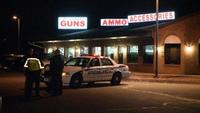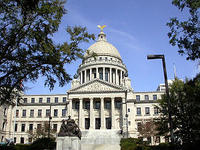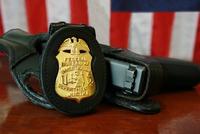-
EPA slams State Department’s Keystone XL pipeline review
The Environmental Protection Agency (EPA) on Monday criticized the State Department’s environmental impact review of the Keystone XL pipeline, saying there was not enough evidence to back up key conclusions in the review on emissions, safety, and alternative routes. The EPA’s comments could have a negative effect on the approval of the project, but if the project is approved, the comments could serve as supporting evidence in any ligation against the pipeline.
-
-
U.S. hospitals shipping sick immigrants back to their home countries

Hundreds of immigrants who are in the United States illegally end up in the hospital only to find out they will be sent home through a removal system run by hospitals trying to avoid the high cost of treating illegal immigrants.
-
-
CBP agent acquitted in abuse case

Customs and Border Patrol (CBP) agent Luis Fonseca was acquitted of one count of deprivation of rights last Friday. The CBP has recently been under scrutiny for its rules on the use of force and the acquittal is considered a victory for the agency.
-
-
ATF: store which sold guns to Lanza’s mother committed more than 500 firearm violations

The Bureau of Alcohol, Tobacco, Firearms and Explosives (ATF) found that the gun store which sold the mother of Adam Lanza the guns he used to carry out the Sandy Hook Elementary massacre, had been cited for more than 500 violations of federal firearms laws and regulations. The store’s license has now been revoked.
-
-
Mississippi to add terrorism to crimes for which death penalty may be sought

The state of Mississippi is considering adding terrorism to the list of crimes for which the death penalty could be applied if a victim is killed during an incident. Constitutional lawyers say the law is not likely to be used much since significant acts of terrorism are typically prosecuted as federal offenses. They also say that it would not be bad idea for the law to cover a renewal of Ku Klux Klan-style killings in the future.
-
-
Napolitano’s arguments about border security undermined by rise in arrests

As recently as last Thursday, DHS secretary Janet Napolitano said that border security is at its most robust in years. New numbers released on the same day tell a different story about activity on the border: arrests on the border are up 13 percent compared to this time last year, from 170,223 last year to 192,298 this year. Napolitano argues that arrests alone are not a reflection of how secure the border is, and that crime statistics in border regions – a better measure of border security, she says — are down from previous years.
-
-
Bipartisan House immigration overhaul bill offers three paths to legal status
While a bipartisan Senate group – the Group of Eight – is set to unveil its immigration overhaul proposal next week when Congress returns from a break, a bipartisan group of House members has come up with its own immigration reform draft. The House members’ proposal divides illegal immigrants into three categories – “Dreamers” and agricultural workers; those with families and jobs in the United States; and those who do not belong in either of the two other categories – and offers immigrants in each category a distinct path to citizenship.
-
-
U.S. prosecutor leaves Texas Aryan Brotherhood case due to safety concerns

A federal prosecutor in Houston has withdrawn from a racketeering case involving the Aryan Brotherhood of Texas. Assistant U.S. attorney Jay Hileman left the case due to concerns over his and his family’s safety after a Kaufman County district attorney and an assistant attorney were killed in two separate incidents. It is not known whether Hileman and his family were specifically threatened.
-
-
Spotting potential killers, rather than armed guards, would make schools safer: study

Tragedies involving children, such as the one at Sandy Hook Elementary School, fuel outrage and calls for immediate action to prevent similar atrocities. Lawmakers are debating different gun control measures, while the National Rifle Association’s unveiled a plan – the National Shield School Proposal — which calls for placing armed guards at schools. Three criminal justice researchers argue that the NRA’s proposal is problematic, expensive, and would not be effective. The researchers say there is evidence to show that in the majority of school shootings, the assailant suffered from some type of mental health issue, dysfunctional family, problems at school, social isolation, and in some instances, bullying. The article authors suggest that it is these issues that are the root cause of these tragedies, and that in order to prevent school violence, society must address troubled youth.
-
-
Arab Spring protests an isolated occurrence, not new Arab world trend

As the long-term impact of the Arab Spring continues to take shape, researchers warn that the protests that swept across the Middle East and North Africa could mark more of an isolated occurrence than a permanent rise of people power in the region.
-
-
FBI wants 1994 online surveillance law updated
The FBI said the agency’s top priority this year is to update a surveillance law so authorities can monitor in real time Web activities of Americans suspected of committing crimes. The 1994 law, known as the Communications Assistance for Law Enforcement Act (CALEA), applies to telecommunication companies, but only partially to Web-based companies.
-
-
Justice Department agrees 1986 snooping law should be reviewed
The U.S. Justice Department said earlier this week that it supports reviewing legislation which allows U.S. law enforcement officials to read someone’s e-mails without a search warrant. The 1986 Electronic Communications Privacy Act (ECPA) states that federal authorities only need a subpoena issued by a federal prosecutor, not a judge, to search through a person’s e-mails which are older than 180 days or which have already been opened.
-
-
NRC rejects plan for Maryland nuclear reactor
A plan to build a third nuclear reactor in southern Maryland was postponed last week as the Nuclear Regulatory Commission (NRC) upheld an earlier decision to squash the project. the primary reason for the rejection is the fact that the applicant’s parent company, Electricite de France, is 85 percent owned by the French government. U.S. law forbids foreign ownership of U.S. nuclear reactors.
-
-
Widely used FBI surveillance method ruled unconstitutional

A national security letters (NSLs) is an administrative subpoena which allows the FBI to ask Internet companies and communication service providers to turn over subscriber information on American customers, while prohibiting the providers from informing these customers that their personal information has been turned over to the FBI. Since the 9/11 attacks, the bureau has issued an average of 50,000 NSLs a year. A federal judge in California says this is “rendering the statute impermissibly overbroad.”
-
-
Fighting gun restrictions on the international scene

The National Rifle Association (NRA) has taken its campaign against measures aiming to tighten gun control to the international level. The organization has been leading a campaign fight a UN treaty designed to restrict the flow of arms to conflict zones. The treaty is likely to pass, but the NRA appears to have enough support in the Senate to prevent ratification.
-
More headlines
The long view
Preventing Another 'Jan. 6' Starts by Changing How Elections Are Certified, Experts Say
The 2024 presidential election may be a rematch between President Joe Biden and former President Donald Trump, but preventing a repeat of Jan. 6, 2021 — when false claims of a stolen election promoted by Donald Trump and his allies led to an insurrection at the U.S. Capitol —will be top of mind this election year. Research finds broad support among public for nonpartisan certification commissions.
